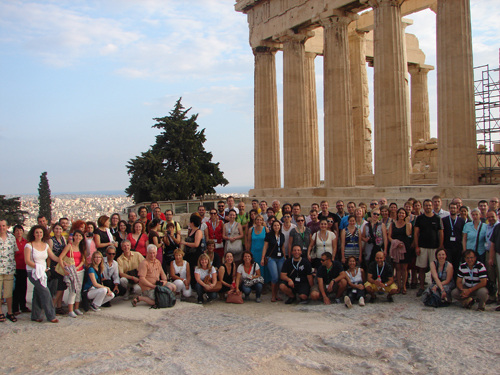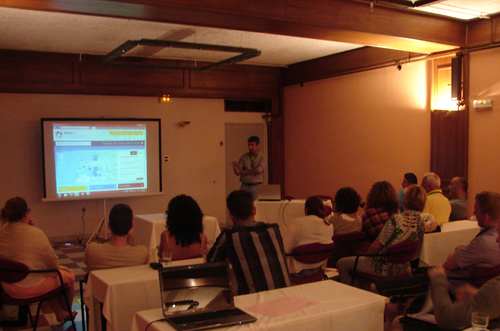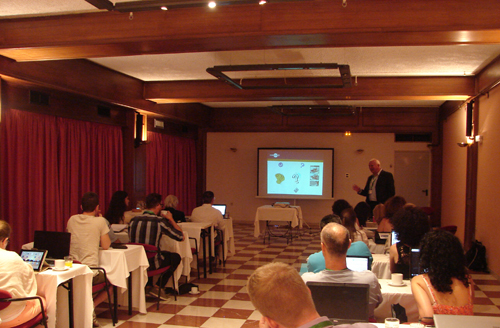Round-up of Summerschool 2014
 The Environmental Protection and the World of Work Summer School 2014 took place in Marathon, Greece from 13/7 to 18/7/2014. It was organized in the context of the “ENTREDU” project, co-financed by the European Commission, Competitiveness and Innovation Programme (CIP), and the “GreeNET” project, which is co-financed by the European Commission, Lifelong Learning Programme (LLP). Overall, teachers, school leaders and education counsellors from both Primary and Secondary Education attended the Summer School, coming from Austria, Belgium, Bulgaria, Cyprus, Denmark, Estonia, Greece, Italy, Spain, and the UK. Two of these participants had received grants from the ERASMUS+ programme, and five were granted scholarships from the “ENTREDU” and the “GreeNET” projects, being the winners of the Entredu European Contest and the Agroweb National Contest respectively.
The Environmental Protection and the World of Work Summer School 2014 took place in Marathon, Greece from 13/7 to 18/7/2014. It was organized in the context of the “ENTREDU” project, co-financed by the European Commission, Competitiveness and Innovation Programme (CIP), and the “GreeNET” project, which is co-financed by the European Commission, Lifelong Learning Programme (LLP). Overall, teachers, school leaders and education counsellors from both Primary and Secondary Education attended the Summer School, coming from Austria, Belgium, Bulgaria, Cyprus, Denmark, Estonia, Greece, Italy, Spain, and the UK. Two of these participants had received grants from the ERASMUS+ programme, and five were granted scholarships from the “ENTREDU” and the “GreeNET” projects, being the winners of the Entredu European Contest and the Agroweb National Contest respectively.
The Environmental Protection and the World of Work Summer School 2014 training course aimed, at first, to develop the skills of environmental and entrepreneurial education for teachers and trainers, in using the deployed technologies in different modes and settings and then, to get familiar with specific issues related to their application to technology-enhanced environmental / entrepreneurial education. Moreover, it aimed to introduce attendants to social tagging learning objects, educational metadata and learning objects repositories, together with hands-on experiences on practical approaches and tools that are commonly used to support the learning object paradigm. Additionally participants were familiarized with best practice projects and networks in entrepreneurial education, with the view to having an overview of entrepreneurial practices and thus integrate them to their everyday practice. At the end of this 5-day course the goal for the participants was to have a clear picture of entrepreneurial skills and how they can teach them to their pupils, to have a clear picture of hot issues on environmental education and how they can communicate them to their pupils, and finally to have a better understanding of how the two issues of environmental and entrepreneurial education are linked. The course, which extended in 26 hours, combined a series of presentations, lectures and hands-on activities. The preparation of the participants included the design of an educational scenario focusing either on entrepreneurial education or on environmental issues – or preferably on both.
 The key note presentations on the opening day of the course covered a wide array of subjects, from Astronomy, Quantum Physics teaching and Geospatial thinking to introducing innovation in schools and were delivered respectively by Rosa Doran (NUCLIO), Frans Renaat (Limburg Catholic University College), Marinos Kavouras (University of Athens) and Nikitas Kastis (MENON Network). On the second day, after an introduction to the course, the participants drew upon the experience of professionals in environmental education and entrepreneurial education, by interviewing them in relation to the aims and objectives of the summer school. Their purpose was to take notes related to the success stories being narrated in front of them and the experiences of the invited guests so that they can use them in the next phases of the event. After building on the ideas generated from these interviews, the participants in groups formulated concrete ideas that can be then developed further. After having a really specific idea that they wanted to develop (i.e. cultivate) further, the participants described it as clearly as possible, identifying a title and a description and outlining its main components, creating in the end, a presentation for it. Finally, the participants’ groups identified and described a value proposition behind their idea, identifying their target audience; having defined these elements the groups discussed their ideas.
The key note presentations on the opening day of the course covered a wide array of subjects, from Astronomy, Quantum Physics teaching and Geospatial thinking to introducing innovation in schools and were delivered respectively by Rosa Doran (NUCLIO), Frans Renaat (Limburg Catholic University College), Marinos Kavouras (University of Athens) and Nikitas Kastis (MENON Network). On the second day, after an introduction to the course, the participants drew upon the experience of professionals in environmental education and entrepreneurial education, by interviewing them in relation to the aims and objectives of the summer school. Their purpose was to take notes related to the success stories being narrated in front of them and the experiences of the invited guests so that they can use them in the next phases of the event. After building on the ideas generated from these interviews, the participants in groups formulated concrete ideas that can be then developed further. After having a really specific idea that they wanted to develop (i.e. cultivate) further, the participants described it as clearly as possible, identifying a title and a description and outlining its main components, creating in the end, a presentation for it. Finally, the participants’ groups identified and described a value proposition behind their idea, identifying their target audience; having defined these elements the groups discussed their ideas. The third day of the course on a discussion the participants’ experience and previous school projects on the issues examined in the summer school, they had already implemented. The participants discussed their projects’ strong and weak points, and also the lessons learnt. The ODS portal and authoring tools were demonstrated and the participants were guided into uploading their educational scenarios on the ENTREDU and School Gardens 2014 digital communities. These discussions were concluded by presentations of Mr. Kare Moberg from Denmark, Ms. Maria Laina from Greece, Mr. Bruno Apolloni from Italy, Mr. Ruskov Petkor from Bulgaria and Mr. Allan Nordby Ottesen from Belgium on the role of youth entrepreneurship in education, and of Ms Varvara Petridou, environmental counselor and state policy maker for secondary education in Athens. After spending a day in field examination in a school and discussion on the approaches implemented in the fields of environmental and entrepreneurial education, the summer school participants spent their fourth day on preparing their own educational scenarios, based on the preparation before the summer school and on the discussions during the summer school. Finally, the participants presented their educational scenarios to the group on the last day of the course, which are publicly available through the two aforementioned digital communities.
The third day of the course on a discussion the participants’ experience and previous school projects on the issues examined in the summer school, they had already implemented. The participants discussed their projects’ strong and weak points, and also the lessons learnt. The ODS portal and authoring tools were demonstrated and the participants were guided into uploading their educational scenarios on the ENTREDU and School Gardens 2014 digital communities. These discussions were concluded by presentations of Mr. Kare Moberg from Denmark, Ms. Maria Laina from Greece, Mr. Bruno Apolloni from Italy, Mr. Ruskov Petkor from Bulgaria and Mr. Allan Nordby Ottesen from Belgium on the role of youth entrepreneurship in education, and of Ms Varvara Petridou, environmental counselor and state policy maker for secondary education in Athens. After spending a day in field examination in a school and discussion on the approaches implemented in the fields of environmental and entrepreneurial education, the summer school participants spent their fourth day on preparing their own educational scenarios, based on the preparation before the summer school and on the discussions during the summer school. Finally, the participants presented their educational scenarios to the group on the last day of the course, which are publicly available through the two aforementioned digital communities.







